- Home
- W. Somerset Maugham
(1941) Up at the Villa Page 5
(1941) Up at the Villa Read online
Page 5
A few minutes later he got up. She was shattered. He stood at the side of the bed looking down at her.
`You asked me not to forget you. I shall forget, but you won't'
She did not stir. She glared at him with terrified eyes. He gave a little harsh laugh.
`Don't be afraid. I'm not going to hurt you.’
She said nothing. Unable to withstand the anger of his cruel stare, she closed her eyes. She heard him move stealthily about the darkened room. Suddenly she heard a report and then the sound of a fall. It brought her to her feet with a shriek of dismay.
`God, what have you done?' He was lying in front of the window, with the moonlight pouring down on him. She flung herself down on her knees beside him and called him by his name.
`Karl, Karl, what have you done?'
She took him by the hand and when she dropped it, it fell with a lifeless thud on the floor. She put her hand on his face and on his heart. He was dead. She fell back on her heels and stared at the body with terror. Her mind went blank. She did not know what to do. Her head swam and she was afraid she was going to faint.
Suddenly she started, for she had heard a pattering in the passage, the patter of bare feet; then it stopped and she knew that there was someone outside the door, listening. She stared at it in a panic. There was a soft little knock. She was trembling violently, and it was only by a violent effort that she choked down the scream that came to her lips. She sat there, on the floor, as still as the dead man by her side. The knock was repeated. She forced herself to speak.
`Yes, what is it?’
`Are you all right, Signora?" It was Nina's voice.
`I thought I heard a bang.’
Mary, clenching her hands, dug her nails into her palms in order to force herself to speak naturally.
`You must have been dreaming. I heard nothing. Go to bed.’
`Very well, Signora.’
There was a moment's pause, and then she heard the bare feet pattering away again. As though she could follow the sound with her eyes, Mary, turning her head, followed it down the passage. She had spoken instinctively to give herself time to gather her wits together. She sighed deeply. But something had to be done. She leant over to look once more at the Austrian. She shuddered. Getting on to her feet again, she put her hands under the dead man's arms and tried to drag him out of the window. She hardly knew what she was doing; it was some blind impulse that led her to want somehow to get him out of the room. But the body was heavy. She gave a gasp of anguish; she felt as weak as a rat. Now she couldn't think what to do. Suddenly it occurred to her that it had been madness to send Nina away. How could she explain that, with that man lying dead in the room, she had said there was nothing the matter? Why had she said that she had heard no sound when he had shot himself within those four walls? A confused rush of all the terrible difficulties of her position swirled in her head like a whirlpool. And the shame. The dishonour. And what answer could she give when they asked her why he had killed himself? The only thing she could do was to tell the truth; and the truth was vile. It was awful to be alone there without anyone to help her and tell her what to do. In her distraction she felt she must see someone. Help, help, she must have help. Rowley. He was the only person she could think of. She was sure he would come if she asked him. He liked her, he said he loved her, and, bad lot as he was, he was a good sort; at all events he'd give her advice. But it was so late. How could she expect to get hold of him like that, in the middle of the night? But she couldn't wait till daybreak, nothing would be any good unless it were done at once.
There was a phone by her bed. She knew the number because Edgar had stayed at the same hotel and she had often called him. She dialed it. At first there was no reply and then an Italian voice answered. Presumably it was a night porter whom she had roused out of a stolen nap. She asked to be put through to Rowley's room. She could hear the bell ringing, but there was no answer. For a moment she was terrified, thinking that he was out; he might have gone somewhere after he left her, to gamble or, being what he was, he might have found some woman and gone home with her. She gave a sigh of relief when she heard a cross, sleepy voice.
`Yes. What is it?”
‘Rowley. It's me. Mary. I'm in frightful trouble.’
She suddenly felt that he was wide awake. He gave a little chuckle.
`Late to get into trouble, isn't it? What's it all about?’
`I can't tell you. It's serious. I want you to come here.’
`When?”
‘Now. At once. As soon as you can. For God's sake.’
He heard the quaver in her voice.
`Of course I'll come. Don't worry.’
What a comfort those two words were. She put down the receiver. She tried to think how long he'd be. It was more than three miles, much of it uphill, from the hotel to her villa. At that hour he wouldn't be likely to get a taxi; if he had to walk it would take him nearly an hour. In an hour it would be dawn. She could not wait in the room. It was horrible. She changed quickly from the wrap she was wearing into a dress. She turned out the light, unlocked the door, very cautiously in order not to make a sound, and slipped into the passage; she opened the front door and walked down the monumental stairway that led to the drive, then along the drive, keeping in the shade of the trees that lined it - for the moon, which before had filled her with such rapture, now, by the light it gave, terrified her - till she came to the gates. Here she stood. She was sick at heart when she thought of the interminable time she must still wait. But suddenly she heard footsteps, and panic-stricken she cowered back into the shadows. It was someone coming up the steep flight of steps which led from the bottom of the hill to the villa and which till the road had been made was its on],,, means of access. Whoever it was, was coming to the villa and seemed to hurry. A man came out of the darkness and she saw it was Rowley. Her relief was overwhelming.
`Thank God, you've come. How did you get here so quickly?’
`The night porter was asleep, so I borrowed his bike. I've hidden it at the bottom. I thought I'd get here more quickly by the steps.’
`Come.’
He peered into her face.
`I say, what's the matter? You look like hell.’
She shook her head. She couldn't tell him. She seized his arm and walked quickly back to the house.
`Be as quiet as you can,' she whispered when they got inside.
`Don't speak.’
She led him to her room. She opened the door and he followed her in. She closed and locked it. For a moment she could not bring herself to turn on the light, but there was no help for it. She touched the switch. A great chandelier hung from the ceiling and at once the room was brilliantly alight. Rowley gave a violent start when his eyes fell on the body of a man lying on the floor near one of the two big windows.
`My God!' he cried. He turned and stared at her.`What does it mean?’
`He's dead.’
`It looks damned well like it'
He knelt and pulled down one of the man's eyelids, then, as Mary had done, put his hand on his heart
`He's dead all right.’ The revolver was still clasped in the man's hand. `He killed himself.’
`Did you think I'd killed him?’
`Where are the servants? Have you sent for the police?’
`No,' she gasped.
`But you must. He can't be left there. You must do something.’
Mechanically, without thinking what he was doing, he loosened the revolver from the man's hand. He looked at it.
`That looks damned like the gun you showed me in the car.’
, It is., He stared at her. He couldn't understand. How could he understand? The situation was incomprehensible.
`Why did he shoot himself?”
‘For God's sake don't ask me questions.’
`Do you know who he is?”
‘No.’
She was pale and trembling. She looked as if she were going to faint.
`You'd better pull yourself to
gether, Mary. No good getting jittery, you know. Wait a minute, I'll go along to the dining-room and get you some brandy. Where is it?' He started to go, but with a cry she stopped him.
`Don't leave me. I'm afraid to stop here by myself.’
`Come along, then,' he said abruptly. He put his arm round her shoulders to support her and led her from the room. The candles were still burning in the dining-room and the first thing he saw when he entered was what remained of the supper they had eaten, the two plates, the two glasses, the bottle of wine and the frying-pan in which Mary had cooked eggs and bacon. Rowley walked up to the table. By the side of the chair in which Karl had sat was his shabby felt hat. Rowley picked it up, looked at it and then turned to look at Mary. She could not meet his eyes.
`It wasn't true when I said I didn't know him’
`That, I must say, is almost painfully obvious.’
`For God's sake don't talk like that, Rowley. I'm so terribly unhappy.’ I’m sorry,' he said gently.
`Who is he, then?’
`The violinist. At the restaurant. The man who came round with the plate. Don't you remember?”
‘I thought his face was vaguely familiar. He was dressed like a Neapolitan fisherman, wasn't he? That's why I didn't recognize him. And of course he looks different now. How did he happen to be here?' Mary hesitated.
`I met him just as I was coming home. He was on the terrace half-way up the road. He talked to me. He seemed so lonely. He looked terribly unhappy.’
Rowley looked down at his feet. He was embarrassed. Mary was the last woman in the world he would have expected to do what he could not but suspect that she had done.
`Mary dear, you know I'd do anything in the world for you. I want to help you’
`He was hungry. I gave him something to eat.’
Rowley frowned.
`And after you'd given him a snack he just went and shot himself with your revolver. Is that the idea?' Mary began to cry.
`Here, have a drink of wine. You can cry later.’
She shook her head.
`No, I'm all right. I won't cry. I know now it was madness, but it seemed different then. I suppose for a minute I was crazy. You know what I told you in the car, just before you got out.’
He suddenly understood what she meant.
`I thought it was a lot of romantic tripe. I never guessed you could be mad enough to do such a damn-fool thing. Why did he kill himself?’
`I don't know. I don't know.’
He reflected a minute and then began to gather the plates and glasses together and put them on the tray.
`What are you doing?' she asked.
`Don't you think it's just as well to leave no trace that you had a gentleman in to supper? Where's the kitchen?”
‘Through that door and down a flight of stairs.’
He took the tray out. When he came back Mary was sitting at the table with her head in her hands.
`It's lucky I went down; you'd left all the lights on. You're evidently not used to covering up your tracks. Your servants hadn't washed up after their dinner. I just put the things with the rest. The chances are they won't notice. Now we must send for the police' She almost screamed.
`Rowley!’
`Listen to me, dear. You've got to keep your head. I've been thinking a lot and I'll tell you what I suggest. You must say that you were asleep and you were awakened by a man, obviously a burglar, coming into your room. You put on the light and snatched up the gun, which was on the bed table. There was a struggle and the gun went off. If you shot him or if he shot himself doesn't matter. It's probable enough that when he found himself cornered and was afraid your screams would bring along the servants he shot himself.’
`Who's going to believe a story like that? It's incredible.’
`Anyhow it's more credible than the truth. If you stick to it no one can prove it's a lie.’
`Nina heard the shot. She came along to my room and asked if anything was the matter. I said no. She'll tell them that, when the police question her. How am I going to explain then? The story will fall to pieces. Why should I have told her nothing was the matter when a man was lying dead in my room? It's hopeless.’
`You can't bring yourself to tell me the truth?”
‘It's so disgraceful. And yet - at the time - I thought I was doing something rather beautiful.’
She said no more and he stared at her, half understanding, but still puzzled. She gave a deep sigh.
`Oh, yes, let's send for the police and get it over with. It means ruin. Well, I suppose I've deserved it. I shall never be able to look anyone in the face again. The newspapers. And Edgar. That's the end of that.’
Then she said a surprising thing.
`After all, he wasn't a thief. I did him harm enough without casting a slur like that on the poor boy. I'm to blame for everything and I must take what's coming to me.’
Rowley looked at her intently.
`Yes, it means ruin, you're right there, and a hell of a scandal. You're in for an awful time, dear, and if it comes out nobody can help you. Are you willing to take a risk? I warn you, it's a great risk and if it doesn't come off it'll make it all the worse for you.’
`I'll take any risk.’
`Why can't we get the body away from here? Who could suspect then that his death had anything to do with you?’
`How can we? It's impossible.’
`No, it isn't. If you'll help me we can get him into the car. You know all these hills round here. We can surely find a place to put him where he won't be found for months.’
`But he'll be missed. They'll look for him.’
`Why should they? Who's going to bother about an Italian fiddler? He might have just done a bolt because he couldn't pay his rent, or run away with somebody else's wife.’
`He wasn't Italian. He was an Austrian refugee.’
`Well, that's all the better. Then you can bet your boots no one's going to make a song and dance about him.’
`It's an awful thing to have to do, Rowley. And what about you? Aren't you taking a fearful risk?’
`It's the only thing to do, my dear, and as far as I'm concerned you needn't worry about that. To tell you the truth I rather like taking chances. I'm for getting all the thrills out of life one can.’
It heartened Mary to hear him speak so lightly. Her anguish seemed not quite so intolerable. There was just a hope that they might be able to do what he proposed. But once more doubt assailed her.
`It'll be light soon. The peasants will be setting out to their work as soon as it's dawn.’
He glanced at his watch.
`When. does it get light? Not before five. We've got an hour. If we look sharp we can just manage lt.’
She sighed deeply.
`I put myself in your hands. I'll do whatever you say.’
`Come on, then. And keep a stiff upper lip for Christ's sake.’
Rowley picked up the dead man's hat and they went back into the room in which he was lying.
`Catch hold of the legs,' said Rowley.
`I'll take him under the arms.’
They lifted him up and carried him into the hall and out of the front door. With difficulty, Rowley walking backwards, they got him down the steps. Then they put the body down. It seemed fearfully heavy.
`Can you bring the car up here?' asked Rowley.
`Yes, but there's no place to turn. I shall have to back down,' she answered doubtfully.
`I'll manage that.’
She walked down to the end of the narrow drive and brought the car up. Meanwhile Rowley went back into the house. There was blood on the marble floor not much, fortunately, because the man had shot himself through the breast and the haemorrhage was internal. He went into the bathroom, took a towel off the rack and soaked it in water. He mopped up the bloodstains. The floor was of a deep red marble and he was pretty sure that on a cursory glance, the sort of glance a maid would give who was sweeping, nothing would be apparent. He took the wet, blood-stained towel i
n his hand and once more went out. Mary was waiting by the car. She did not ask him what he had been doing. Rowley opened the rear door and again put his arms under the dead man's. He hoisted him up and Mary, seeing he was having difficulty, lifted the feet. They did not speak. They laid the body on the floor and Rowley wrapped the towel round the dead man's middle in case the jolting caused a flow of blood. He jammed the soft hat on his head. Rowley got into the driving seat and backed down to the gates. Here there was plenty of room to turn.
`Shall I drive?”
‘Yes. Turn to the right at the bottom of the hill.’
`Let's get off the main road as soon as we can.’
`About four or five miles along there's a road that leads up to a village on the top of a hill. I think I remember a wood on one side.’
When they came to the highway Rowley put on speed.
`You're driving awfully fast,' said Mary.
`We haven't got much time to waste, my sweet' he said acidly.
`I'm so terribly scared.’
`That's going to do a fat lot of good.’
His manner was bitter and she was silent The moon had set and it was very dark. Mary could not see the speedometer; she had a notion they must be doing hard on eighty. She sat with her hands clenched. It seemed an awful thing that they were doing, a dangerous thing, and yet it was her only chance. Her heart was beating painfully. She kept on repeating to herself:
`What a fool I've been!’
`We must have gone about five miles now. We haven't missed the turning, have we?’
`No, but we ought to be getting to it soon. Slow down a little.’
They went on. Mary looked anxiously for the narrow road that led winding up to the hill town. She had been along it two or three times, tempted by the sight of it in the distance, for it looked like one of those hill towns in the background of an old Florentine picture, one of those pictures of a scene from the Gospels which the painter has set in the lovely landscape of his native Tuscany.

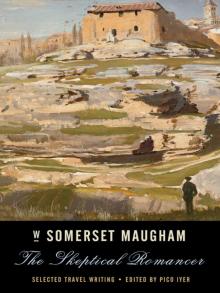 The Skeptical Romancer: Selected Travel Writing
The Skeptical Romancer: Selected Travel Writing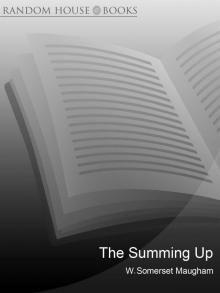 The Summing Up
The Summing Up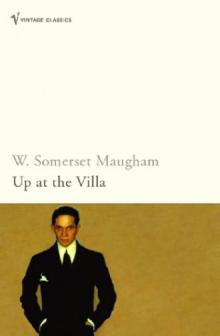 Up at the Villa
Up at the Villa The Razor's Edge
The Razor's Edge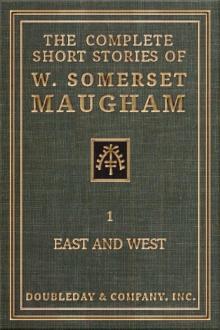 The Complete Short Stories of W. Somerset Maugham: East and West (Vol. 1 of 2))
The Complete Short Stories of W. Somerset Maugham: East and West (Vol. 1 of 2))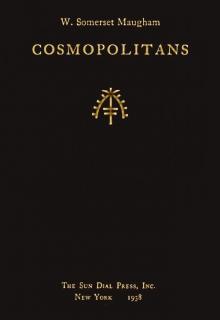 Cosmopolitans
Cosmopolitans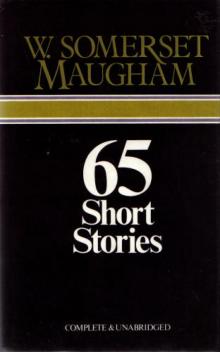 65 Short Stories
65 Short Stories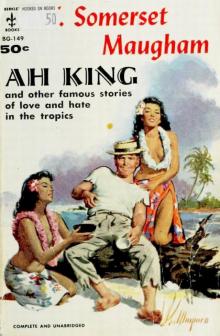 Ah King (Works of W. Somerset Maugham)
Ah King (Works of W. Somerset Maugham)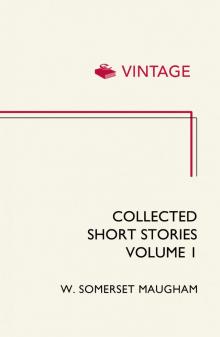 Collected Short Stories: Volume 1
Collected Short Stories: Volume 1 Collected Short Stories Volume 2
Collected Short Stories Volume 2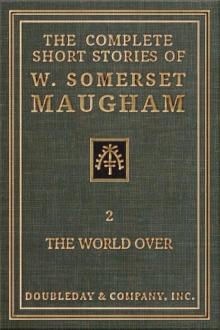 The Complete Short Stories of W. Somerset Maugham - II - The World Over
The Complete Short Stories of W. Somerset Maugham - II - The World Over Collected Short Stories Volume 4
Collected Short Stories Volume 4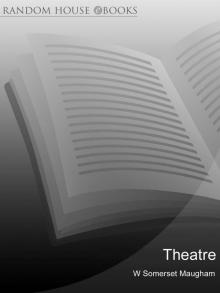 Theatre
Theatre Short Stories
Short Stories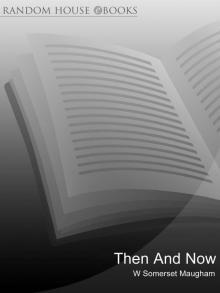 Then and Now
Then and Now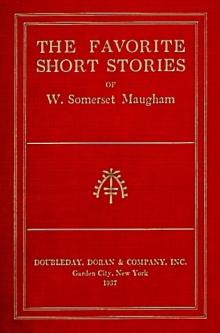 The Favorite Short Stories of W. Somerset Maugham
The Favorite Short Stories of W. Somerset Maugham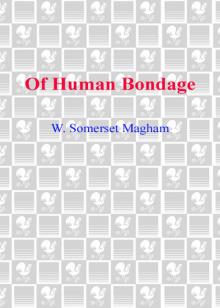 Of Human Bondage
Of Human Bondage The Magician
The Magician The Great Exotic Novels and Short Stories of Somerset Maugham
The Great Exotic Novels and Short Stories of Somerset Maugham A Writer's Notebook
A Writer's Notebook Christmas Holiday
Christmas Holiday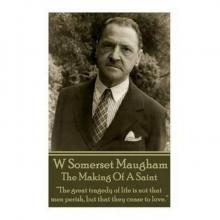 The Making of a Saint
The Making of a Saint Merry Go Round
Merry Go Round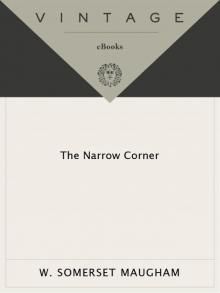 The Narrow Corner
The Narrow Corner Collected Short Stories Volume 3
Collected Short Stories Volume 3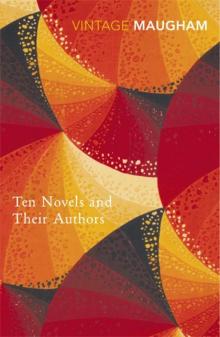 Ten Novels and Their Authors
Ten Novels and Their Authors Ashenden
Ashenden The Moon and Sixpence
The Moon and Sixpence Cakes and Ale
Cakes and Ale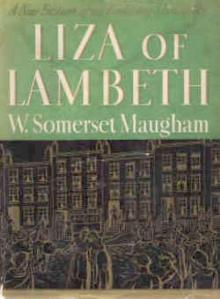 Liza of Lambeth
Liza of Lambeth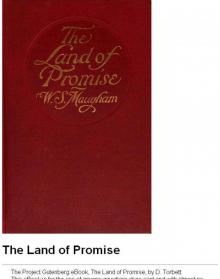 The Land of Promise: A Comedy in Four Acts (1922)
The Land of Promise: A Comedy in Four Acts (1922) A Writer's Notebook (Vintage International)
A Writer's Notebook (Vintage International)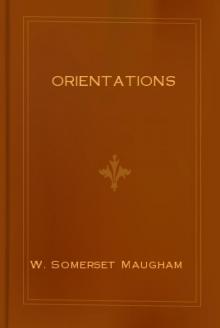 Orientations
Orientations Selected Masterpieces
Selected Masterpieces Mrs Craddock
Mrs Craddock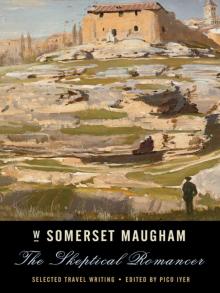 The Skeptical Romancer
The Skeptical Romancer On a Chinese Screen
On a Chinese Screen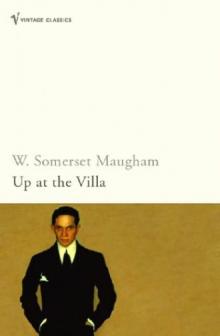 (1941) Up at the Villa
(1941) Up at the Villa The Great Novels and Short Stories of Somerset Maugham
The Great Novels and Short Stories of Somerset Maugham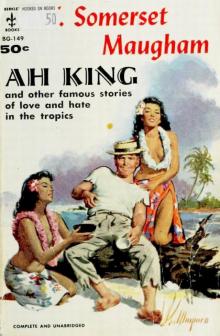 Ah King
Ah King The Explorer
The Explorer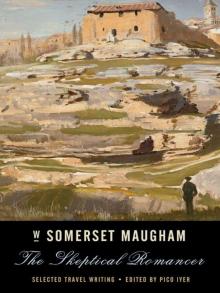 The Skeptical Romancer: Selected Travel Writing (Vintage Departures)
The Skeptical Romancer: Selected Travel Writing (Vintage Departures)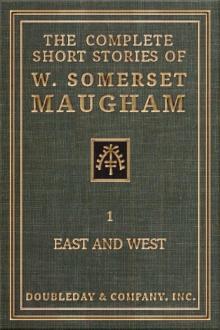 The Complete Short Stories of W. Somerset Maugham - I - East and West
The Complete Short Stories of W. Somerset Maugham - I - East and West